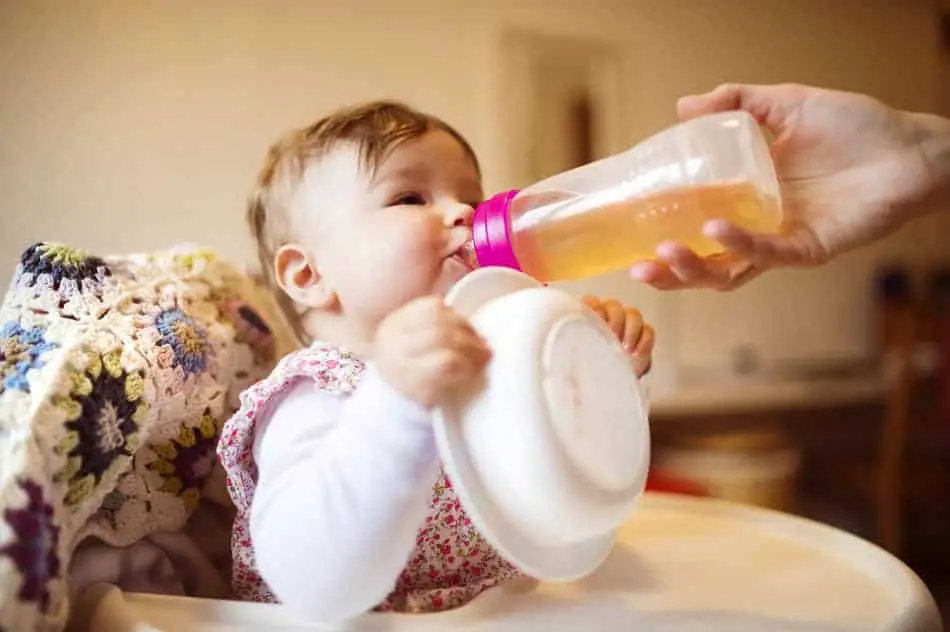Pedialyte is a popular electrolyte solution marketed for use in children. While children may not care one way or the other, a lot of vegans raise kids on 100% plant-based diets and want to know if the drink is suitable for vegan children.
Obviously, you’ll want to consult a Pediatrician when it comes to matters of child nutrition, but I can speak to the vegan status of the drink by analyzing the ingredients.
Is it vegan? Yes, Pedialyte is 100% vegan. Formulations vary, but most are some combination of water, dextrose (simple sugar), citric acid, flavorings, minerals, artificial sweeteners, and food colorants. All of which are vegan-friendly.1
There’s really not a whole lot to look out for when it comes to fruit-flavored drinks. Manufacturers are pretty creative when it comes to finding ways to slip animal products into foods and beverages, but fruity drinks are kind of an exception.
Especially sports drinks. (Pedialyte is not really a sports drink, but it’s kind of in the same category). When it comes to beverages, milk and dairy derivatives are the usual culprits, and who wants chocolate or cream-based drinks during physical activity.
Anyway, what we’ll do here is go over the various reasons Pedialyte is considered vegan.
Why Pedialyte Is Considered Vegan
Artificial Sweeteners Are Vegan
Pedialyte drinks use sucralose and acesulfame potassium or acesulfame K.
Not all flavors do. For example, the original unflavored variety only contains water, dextrose, salt, potassium citrate, sodium citrate, and zinc gluconate.2
Sucralose is a popular sweetener and is the kind used in Splenda and its generic spinoffs.
It’s manufactured by taking regular table sugar (sucrose) and adding chlorine to the molecules in a multistep chlorination process, which swaps out the hydroxyl groups of sucrose for chlorine atoms.3,4
Table sugar is vegan, and chlorine is vegan, thus sucralose is vegan.
Acesulfame potassium is a calorie-free sugar substitute usually marketed under the trade names Sweet One and Sunett.
It’s made by reacting acetoacetic acid with potassium, both of which are vegan.5,6
The Artificial Colors Are Vegan
This isn’t always the case with processed foods and beverages.
Red 40, or Allura red is a common food colorant in Pedialyte beverages.
The strawberry variety contains water, dextrose, potassium citrate, citric acid, salt, sodium citrate, natural flavor, artificial sweeteners, zinc gluconate, Red 40, and Blue 1.7
The cherry punch flavor contains water, dextrose, galactooligosaccharides, natural and artificial flavors, sodium citrate, potassium citrate, salt, zinc gluconate, artificial sweeteners, and Red 40.8
Red 40, is perfectly vegan-friendly. It sometimes gets confused with another common food coloring agent known as Red 4, due to the similar name and color. Red 40 (the kind in Pedialyte) is an azo dye, which means it’s petroleum-derived.9
It can even be derived from a certain type of strawberries.10
Thus, it’s always considered vegan.
Red 4, on the other hand, is another name for the infamous carmine, a red pigment sourced from beetles.11,12
Blue 1, aka Brilliant Blue, is another common dye in Pedialyte drinks.
For example, Berry Frost contains water, dextrose, galactooligosaccharides, citric acid, salt, potassium citrate, sodium citrate, natural and artificial flavor, artificial sweeteners, zinc gluconate, and Blue 1.13
It’s common in processed foods, supplements, medications, and cosmetics.14
It’s not an azo dye, but it is produced synthetically without the use of animal-derived precursors.15
Then, there’s Yellows 5 and 6. For example, the Mixed Fruit flavor contains water, dextrose, natural and artificial flavor, citric acid, potassium citrate, sodium citrate, salt, zinc gluconate, sucralose, acesulfame potassium, and Yellow 6.16
Yellow 5 (tartrazine) and Yellow 6 (Sunset Yellow) are both azo dyes so they are also considered vegan.17,18
The Micronutrients Are Vegan
Zinc gluconate is the form of zinc you’ll find in nutritional supplements including zinc and multivitamins/minerals.
It’s just the zinc salt form of gluconic acid and is considered suitable for vegans and vegetarians.19
Citric acid is produced using simple sugars to feed a strain of mold known as Aspergillus niger.20
So, it’s microbially produced and thus vegan.
Potassium citrate, another common in Pedialyte drinkes, is a potassium salt of citric acid. So, it’s 100% vegan.21
Dextrose Is Vegan
Dextrose is another name for glucose, it’s a source of simple carbs. It’s a white powdery substance, and common sweetener, so it’s kind of looked upon with suspicion. In the US, processed white sugar is usually processed with bone char.
Bone char is a type of charcoal made by roasting bones and is used to refine white cane sugar to remove impurities.
And I have read folks on various sites speculate about whether bone char is used in dextrose.
First and foremost, bone char isn’t used to process dextrose.
Secondly, even if it were, most vegans don’t avoid products containing processed sugar. PETA, which is a pretty strict organization with high standards, recommends that we not stress about whether sugar in a given food product is processed with bone char.22
So, dextrose is good to go.
That’s it for the vegan status of Pedialyte. Thanks for reading.
You may also want to check out the following related articles:
References
- Pedialyte® Classic. https://pedialyte.com/products/classic/unflavored
- (4 pack) Pedialyte Electrolyte Solution, Hydration Drink, Unflavored, 1 Liter. https://www.walmart.com/ip/4-pack-Pedialyte-Electrolyte-Solution-Hydration-Drink-Unflavored-1-Liter/969787175
- Bert Fraser-Reid, 2012, “From Sugar to Splenda: A Personal and Scientific Journey of a Carbohydrate Chemist and Expert Witness,” Berlin:Springer, pp. 199-210. ISBN 3642227805
- US5498709A – Production Of Sucralose Without Intermediate Isolation Of Crystalline Sucralose-6-Ester. https://patents.google.com/patent/US5498709
- Everything You Need to Know About Acesulfame Potassium. https://foodinsight.org/everything-you-need-to-know-about-acesulfame-potassium/
- Acesulfame K. https://en.wikipedia.org/wiki/Acesulfame_potassium
- Pedialyte ready-to-feed, retail 1 l bottle, strawberry part no. 53983 (1/ea). https://www.walmart.com/ip/Pedialyte-ready-to-feed-retail-1-l-bottle-strawberry-part-no-53983-1-ea/393145081
- (4 pack) Pedialyte AdvancedCare Electrolyte Solution with PreActiv Prebiotics, Hydration Drink, Cherry Punch, 1 Liter. https://www.walmart.com/ip/4-pack-Pedialyte-AdvancedCare-Electrolyte-Solution-with-PreActiv-Prebiotics-Hydration-Drink-Cherry-Punch-1-Liter/574042144
- Allura Red AC. https://www.sciencedirect.com/topics/agricultural-and-biological-sciences/allura-red-ac
- Potera, C., 2010. Diet and nutrition: the artificial food dye blues. Environ Health Perspect. 118 (10), A428–A431.
- Animal-derived Ingredients Resource: Living. https://www.peta.org/living/food/animal-ingredients-list/
- Bug-Based Food Dye Should Be Exterminated, Says CSPI. https://cspinet.org/news/bug-based-food-dye-should-be-exterminated-says-cspi-20060501
- Pedialyte AdvancedCare+ Electrolyte Drink, Berry Frost, 1 Liter, 4 Count. https://www.walmart.com/ip/33-Frost-Berry-Prebiotics-Powder-Drink-oz-AdvancedCare-Powder-6-More-Electrolyte-0-6-Electrolytes-Pedialyte-Plus-PreActiv-Packets-Count/854764848
- Brilliant Blue FCF. https://iacmcolor.org/color-profile/brilliant-blue-fcf-fdc-blue-no-1/
- El Ali, Bassam M.; Bassam El Ali; Ali, Mohammad Farahat (2005). Handbook of industrial chemistry: organic chemicals. New York: McGraw-Hill. ISBN 978-0-07-141037-3.
- (4 pack) Pedialyte Electrolyte Solution, Hydration Drink, Mixed Fruit, 1 Liter. https://www.walmart.com/ip/4-pack-Pedialyte-Electrolyte-Solution-Hydration-Drink-Mixed-Fruit-1-Liter/120737462
- Yellow 5. https://en.wikipedia.org/wiki/Tartrazine
- Yellow 6. https://en.wikipedia.org/wiki/Sunset_Yellow_FCF
- Jack Norris RD of Vegan Health. https://veganhealth.org/zinc/
- Citric Acid. https://en.wikipedia.org/wiki/Citric_acid#Natural_occurrence_and_industrial_production
- Potassium Citrate. https://en.wikipedia.org/wiki/Potassium_citrate
- Is Sugar Vegan? https://www.peta.org/living/food/is-sugar-vegan/

